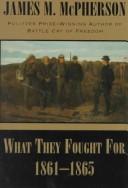Check nearby libraries
Buy this book

What They Fought For, 1861-1865, by the renowned historian James M. McPherson, is an exceptional discourse on the Civil War, a colloquy among the very men who risked their lives in that conflict. McPherson draws on the letters or diaries of nearly one thousand Union and Confederate soldiers in investigating what motivated those who fought the Civil War.
His conclusion that most of them felt a keen sense of patriotic and ideological commitment counters the prevailing belief that Civil War soldiers had little or no idea of what they were fighting for.
McPherson points out that the armies of the Civil War were the most literate in history up to that time (80 percent of Confederates, 90 percent of white Unionists) and consisted mainly of volunteers rather than draftees or long-service regulars. Moreover, these soldiers lived in the world's most politicized and democratic society, and throughout the conflict they continued to read newspapers, vote in state and national elections, and openly discuss ideological issues.
Their letters home were not subject to censorship, nor were the soldiers discouraged from keeping diaries; in both genres, they commented - often with great candor and eloquence - on a wide variety of issues connected with their war experience.
What McPherson learned from these writings was that liberty and republicanism formed the ideological core of the cause for which soldiers of both sides fought. Confederates and Unionists alike saw themselves as custodians of the legacy of 1776, and the Civil War as a test of whether they were worthy of the heritage of liberty bequeathed to them by the founding fathers.
McPherson first considers the Confederates' articulation of their reasons for fighting, quoting liberally from among the letters and diaries of 374 soldiers. He then uses excerpts from the writings of 562 Union soldiers in describing the range of thought and feeling concerning their part in the war.
Finally, he looks at both sides' perceptions of the importance of slavery to the war, including the double paradox of southerners fighting for the freedom to hold slaves while the Emancipation Proclamation caused bitter differences of opinion among northern troops.
In What They Fought For, which originated as the fifty-fifth series of Walter Lynwood Fleming Lectures, McPherson has taken individual voices - brave or fearful, resigned or full of hope, merciless or touched with compassion - and placed them in the great and terrible choir of a country divided against itself.
The result is both an impressive scholarly tour de force and a lively, highly accessible account of the sentiments of both northern and southern soldiers during the national trauma of the Civil War.
Check nearby libraries
Buy this book

Previews available in: English
| Edition | Availability |
|---|---|
|
1
What they foughtfor, 1861-1865
1995, Doubleday
in English
- 1st Anchor Books ed.
0385476345 9780385476348
|
zzzz
|
|
2
What they fought for, 1861-1865
1995, Anchor Books
in English
- 1st Anchor Books ed.
0385476345 9780385476348
|
eeee
|
|
3
What they fought for, 1861-1865
1994, Louisiana State University Press
in English
0807119040 9780807119044
|
aaaa
|
Book Details
Edition Notes
Includes bibliographical references (p. 71-85) and index.
Classifications
The Physical Object
Edition Identifiers
Work Identifiers
Source records
Scriblio MARC recordIthaca College Library MARC record
Internet Archive item record
marc_openlibraries_phillipsacademy MARC record
marc_openlibraries_sanfranciscopubliclibrary MARC record
Better World Books record
Library of Congress MARC record
marc_scms MARC record
Promise Item
marc_columbia MARC record
marc_columbia MARC record
Work Description
From Google Books: "In Battle Cry Of Freedom, James M. McPherson presented a fascinating, concise general history of the defining American conflict. With What They Fought For, he focuses his considerable talents on what motivated the individual soldier to fight.
In an exceptional and highly original Civil War analysis, McPherson draws on the letters and diaries of nearly one thousand Union and Confederate soldiers, giving voice to the very men who risked their lives in the conflict. His conclusion that most of them felt a keen sense of patriotic and ideological commitment counters the prevailing belief that Civil War soldiers had little or no idea of what they were lighting for.
In their letters home and their diaries -- neither of which were subject to censorship -- these men were able to comment, in writing, on a wide variety of issues connected with their war experience. Their insights show how deeply felt and strongly held their convictions were and reveal far more careful thought on the ideological issues of the war than has previously been thought to be true."
Community Reviews (0)
History
- Created April 1, 2008
- 19 revisions
Wikipedia citation
×CloseCopy and paste this code into your Wikipedia page. Need help?
| July 25, 2024 | Edited by MARC Bot | import existing book |
| January 7, 2023 | Edited by MARC Bot | import existing book |
| December 4, 2022 | Edited by ImportBot | import existing book |
| November 16, 2022 | Edited by MARC Bot | import existing book |
| April 1, 2008 | Created by an anonymous user | Imported from Scriblio MARC record |










